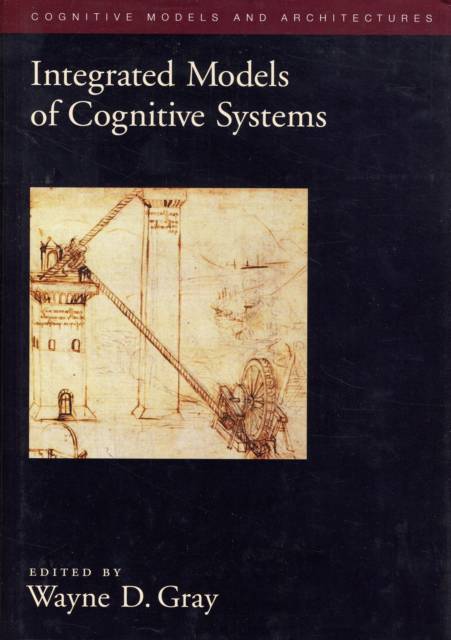
- Retrait gratuit dans votre magasin Club
- 7.000.000 titres dans notre catalogue
- Payer en toute sécurité
- Toujours un magasin près de chez vous
- Retrait gratuit dans votre magasin Club
- 7.000.0000 titres dans notre catalogue
- Payer en toute sécurité
- Toujours un magasin près de chez vous
Description
The field of cognitive modeling has progressed beyond modeling cognition in the context of simple laboratory tasks and begun to attack the problem of modeling it in more complex, realistic environments, such as those studied by researchers in the field of human factors. The problems that the cognitive modeling community is tackling focus on modeling certain problems of communication and control that arise when integrating with the external environment factors such as implicit and explicit knowledge, emotion, cognition, and the cognitive system. These problems must be solved in order to produce integrated cognitive models of moderately complex tasks. Architectures of cognition in these tasks focus on the control of a central system, which includes control of the central processor itself, initiation of functional processes, such as visual search and memory retrieval, and harvesting the results of these functional processes. Because the control of the central system is conceptually
different from the internal control required by individual functional processes, a complete architecture of cognition must incorporate two types of theories of control: Type 1 theories of the structure, functionality, and operation of the controller, and type 2 theories of the internal control of functional processes, including how and what they communicate to the controller. This book presents the current state of the art for both types of theories, as well as contrasts among current approaches to human-performance models. It will be an important resource for professional and student researchers in cognitive science, cognitive-engineering, and human-factors. Contributors: Kevin A. Gluck, Jerry T. Ball, Michael A. Krusmark, Richard W. Pew, Chris R. Sims, Vladislav D. Veksler, John R. Anderson, Ron Sun, Nicholas L. Cassimatis, Randy J. Brou, Andrew D. Egerton, Stephanie M. Doane, Christopher W. Myers, Hansjörg Neth, Jeremy M Wolfe, Marc Pomplun, Ronald A. Rensink, Hansjörg Neth, Chris R. Sims, Peter M. Todd, Lael J. Schooler, Wai-Tat Fu, Michael C. Mozer, Sachiko Kinoshita, Michael Shettel, Alex Kirlik, Vladislav D. Veksler, Michael J. Schoelles, Jerome R. Busemeyer, Eric Dimperio, Ryan K. Jessup, Jonathan Gratch, Stacy Marsella, Glenn Gunzelmann, Kevin A. Gluck, Scott Price, Hans P. A. Van Dongen, David F. Dinges, Frank E. Ritter, Andrew L. Reifers, Laura Cousino Klein, Michael J. Schoelles, Eva Hudlicka, Hansjörg Neth, Christopher W. Myers, Dana Ballard, Nathan Sprague, Laurence T. Maloney, Julia Trommershäuser, Michael S. Landy, A. Hornof, Michael J. Schoelles, David Kieras, Dario D. Salvucci, Niels Taatgen, Erik M. Altmann, Richard A.
Carlson, Andrew Howes, Richard L. Lewis, Alonso Vera, Richard P. Cooper, and Michael D. Byrne
different from the internal control required by individual functional processes, a complete architecture of cognition must incorporate two types of theories of control: Type 1 theories of the structure, functionality, and operation of the controller, and type 2 theories of the internal control of functional processes, including how and what they communicate to the controller. This book presents the current state of the art for both types of theories, as well as contrasts among current approaches to human-performance models. It will be an important resource for professional and student researchers in cognitive science, cognitive-engineering, and human-factors. Contributors: Kevin A. Gluck, Jerry T. Ball, Michael A. Krusmark, Richard W. Pew, Chris R. Sims, Vladislav D. Veksler, John R. Anderson, Ron Sun, Nicholas L. Cassimatis, Randy J. Brou, Andrew D. Egerton, Stephanie M. Doane, Christopher W. Myers, Hansjörg Neth, Jeremy M Wolfe, Marc Pomplun, Ronald A. Rensink, Hansjörg Neth, Chris R. Sims, Peter M. Todd, Lael J. Schooler, Wai-Tat Fu, Michael C. Mozer, Sachiko Kinoshita, Michael Shettel, Alex Kirlik, Vladislav D. Veksler, Michael J. Schoelles, Jerome R. Busemeyer, Eric Dimperio, Ryan K. Jessup, Jonathan Gratch, Stacy Marsella, Glenn Gunzelmann, Kevin A. Gluck, Scott Price, Hans P. A. Van Dongen, David F. Dinges, Frank E. Ritter, Andrew L. Reifers, Laura Cousino Klein, Michael J. Schoelles, Eva Hudlicka, Hansjörg Neth, Christopher W. Myers, Dana Ballard, Nathan Sprague, Laurence T. Maloney, Julia Trommershäuser, Michael S. Landy, A. Hornof, Michael J. Schoelles, David Kieras, Dario D. Salvucci, Niels Taatgen, Erik M. Altmann, Richard A.
Carlson, Andrew Howes, Richard L. Lewis, Alonso Vera, Richard P. Cooper, and Michael D. Byrne
Spécifications
Parties prenantes
- Auteur(s) :
- Editeur:
Contenu
- Nombre de pages :
- 544
- Langue:
- Anglais
- Collection :
- Tome:
- n° 1
Caractéristiques
- EAN:
- 9780195189193
- Date de parution :
- 19-04-07
- Format:
- Livre relié
- Format numérique:
- Genaaid
- Dimensions :
- 257 mm x 178 mm
- Poids :
- 1003 g

Les avis
Nous publions uniquement les avis qui respectent les conditions requises. Consultez nos conditions pour les avis.






